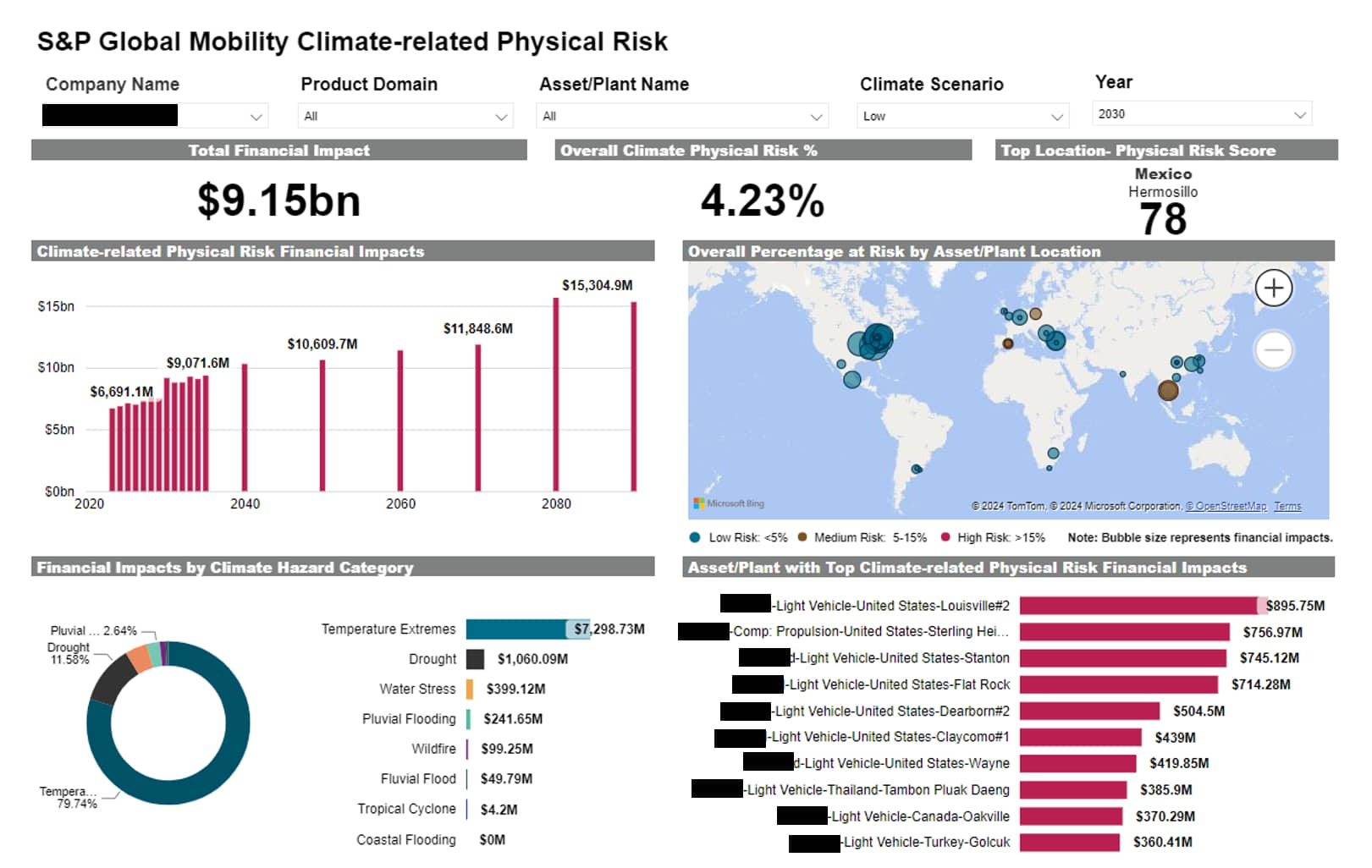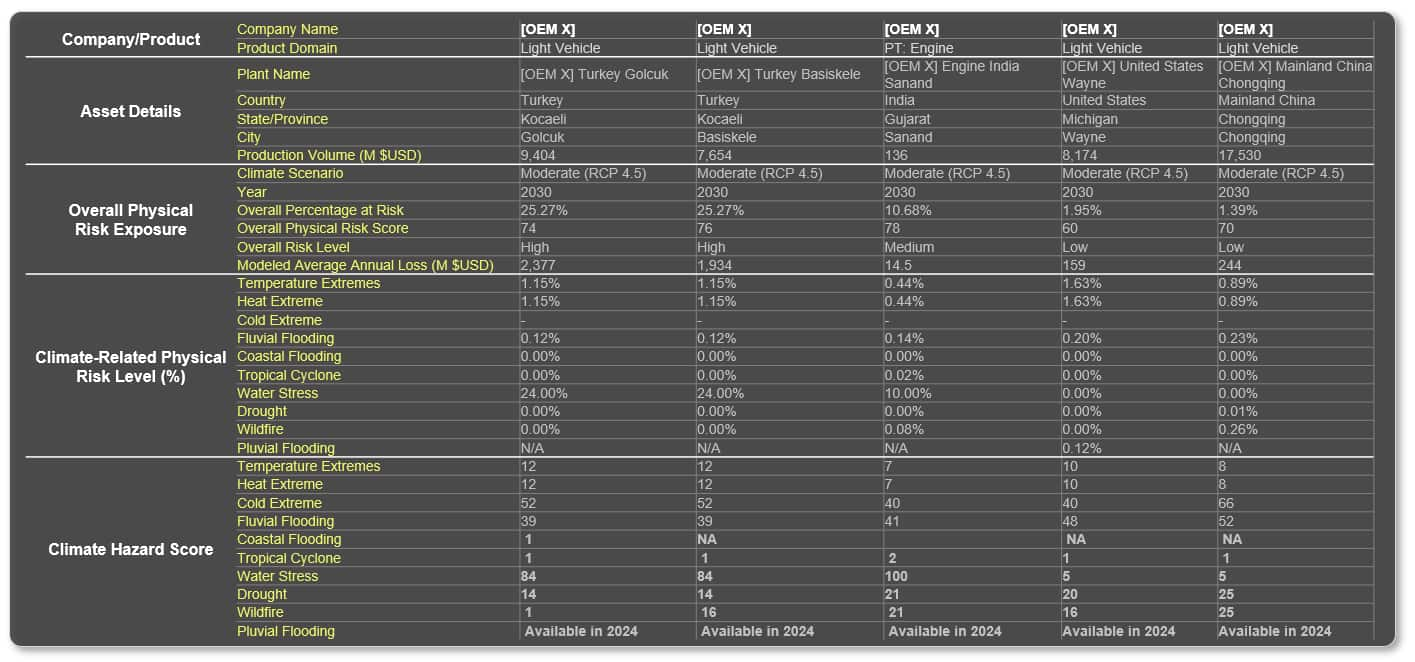Discover more about S&P Global's offerings
Customer Logins
Obtain the data you need to make the most informed decisions by accessing our extensive portfolio of information, analytics, and expertise. Sign in to the product or service center of your choice.
Customer LoginsAssess climate change impact on the automotive industry, its manufacturing plants and supply chain infrastructure
Climate change poses physical risks to the automotive industry, including asset damage, operation interruption, and supply chain disruptions. It is important for automotive manufacturers, suppliers, and financial institutions to understand and manage these risks to ensure long-term sustainability and resilience. The Sustainable Mobility – Automotive Physical Risk offering provides a comprehensive climate risk assessment of the potential impact of climate change on the automotive industry, with a focus on physical risk.
Climate Physical Risk Assessment Benefits:
- Understand climate-related physical risks within the automotive industry: Access a comprehensive view of exposure to physical risks resulting from climate change.
- Better manage risks: Gain actionable insights to help manage climate-related physical risks and improve long-term resilience.
- Improve sustainability and ESG performance: Comply with regulatory requirements related to climate risk disclosure and improve sustainability and ESG performance.
Automotive Plant Climate Physical Risk Assessment
View specific risk and cumulative scores for individual automotive manufacturing plants
Who needs Automotive Industry Climate Physical Risk Assessment?

Financial Institutions
Comprehensive and comparable: Automotive Physical Risk enables financial institutions to run climate physical risk assessments and identify potential climate change risks for automakers' and suppliers' manufacturing plants using a consistent methodology
- Understand the overall associated climate physical risks to the facilities in an investment portfolio
- Understand the financial risk of specific climate hazards for each facility in a portfolio
- Understand what climate change risks exist for various technologies entering into the automotive market

Automakers
Automotive Physical Risk offers automakers a robust and standardized approach to conducting climate physical risk assessments and evaluate potential climate change risks impacting the manufacturing facilities of automakers and their suppliers.
- Understand the specific climate risks to assess what investments are needed at each plant and when they will be needed
- Manage supply chain risk by understanding the climate risks to current and future suppliers' plants

Suppliers
Understand the overall and individual impact of climate change and near-term/long-term physical risk levels for each manufacturing plant in your company
- Understand the specific climate physical risks to assess what investments are needed at each plant and when they will be needed by
- Know about the climate physical risks to potential new plant locations
Use Cases
Our Automotive Physical Risk offering is a valuable tool for financial institutions, automotive manufacturers and suppliers to get climate risk assessments. This enables better understanding and management of climate-related physical risks to ensure long-term sustainability and resilience.
- Climate-related physical risks evaluation: Assess the potential impact of climate change on a company's assets and operations
- Portfolio management for physical risks: Manage the potential financial impact of climate-related physical risks on a portfolio
- Prevention and mitigation planning: Develop strategies to prevent and mitigate the impact of climate-related physical risks
- Supplier risks and backup: Identify and manage risks passed through suppliers and sourcing

Automotive Physical Risk Key Features
These features provide a comprehensive view of exposure to physical risks resulting from climate change, allowing customers to make informed decisions about how to manage these risks.
- 1,500 companies and over 10,000 asset and plant sites
- Company asset and plant level physical risk scores reflecting exposure to climate hazards across IPCC-aligned climate scenarios
- Asset and plant level financial impact metrics reflecting the value of financial costs/losses projected due to changing climate hazard exposure for a given asset, expressed as a percentage of the asset value
- Company level financial impact metrics expressed as weighted average financial impact for all assets linked to the company, weighted by asset size
- Eight climate-related physical risk hazards: extreme heat, extreme cold, coastal flooding, wildfire, drought, fluvial flooding, tropical cyclone and water stress
- Advanced climate physical hazard modeling covering four future climate change scenarios (Low, Medium, Medium-High and High)
- Climate physical risk metrics for eight decades from the 2020s to the 2090s, including annual report from current year to the 2030s based on S&P Global Mobility forecast
Experts
VIEW ALLAnoop Desai
Anoop Desai serves as the Executive Director and Head of Sustainable Mobility at S&P Global Mobility Consulting Services. In this leadership role, he specializes in spearheading sustainability initiatives within the mobility sector. Boasting a robust background in carbon accounting, net-zero pathways, and strategic planning, Anoop stands at the forefront of the drive towards sustainable practices. His pivotal role involves guiding clients through the intricate process of reducing their carbon footprint and crafting effective strategies to attain net-zero emissions. Anoop's expertise in sustainability frameworks, coupled with his adept analysis and interpretation of data, positions him as an invaluable asset to the team. His unwavering dedication to promoting environmentally responsible practices aligns seamlessly with his commitment to steering clients towards sustainable mobility solutions. Anoop's passion for sustainability and his proactive efforts contribute significantly to the mission of creating a greener and more sustainable future, solidifying his role as a key contributor within the S&P Global Mobility team.
Peter Varma
Peter primary responsibility is to enable automotive strategists to develop future products which comply with increasingly stringent environmental standards. He and his team do so by creating, perfecting and proliferating novel and predictive computational software technologies. His previous employers include Novation Analytics, Fiat Chrysler, Volvo and Bell Helicopter and he has accrued over 20 years of experience in product development, product strategy and program management.Peter holds a B.Sc. in Mechanical Engineering from the University of Alberta, a M.Sc. in Automotive Engineering from the Chalmers University of Technology and an MBA from the University of Michigan. He is currently pursuing a Ph.D. in Industrial and Systems Engineering at Wayne State University. His passions are strongly related to his engineering background and include audio, automobiles and motorcycles.

Heidi Schroeder
Heidi specializes in vehicle competitive analysis for the US market. She has over 30 years of automotive experience. Prior to the acquistion of Novation Analytics by IHS Markit (now part of S&P Global), she was vice-president of Novation Analytics, a provider of software solutions, data analysis and advisory services with a focus on vehicle energy requirements and greenhouse gas emissions. Before establishing Novation Analytics, Heidi was a manager of Fuel Economy, Development and Simulation at Chrysler Group, LLC. Her group was primarily responsible for developing technical requirements for key vehicle attributes required to achieve fuel economy and performance targets. Preceding this postion, she held managing and engineering positions at Delphi Automotive and General Motors.Heidi has received her Bachelor of Science degree in mechanical engineering from Cornell University.
{"items" : [
{"name":"share","enabled":true,"desc":"<strong>Share</strong>","mobdesc":"Share","options":[ {"name":"facebook","url":"https://www.facebook.com/sharer.php?u=http%3a%2f%2fstage.www.spglobal.com%2fmobility%2fen%2fproducts%2fautomotive-physical-risk.html","enabled":true},{"name":"twitter","url":"https://twitter.com/intent/tweet?url=http%3a%2f%2fstage.www.spglobal.com%2fmobility%2fen%2fproducts%2fautomotive-physical-risk.html&text=Automotive+Industry+Physical+Risk+Assessment+%7c+S%26P+Global","enabled":true},{"name":"linkedin","url":"https://www.linkedin.com/sharing/share-offsite/?url=http%3a%2f%2fstage.www.spglobal.com%2fmobility%2fen%2fproducts%2fautomotive-physical-risk.html","enabled":true},{"name":"email","url":"?subject=Automotive Industry Physical Risk Assessment | S&P Global&body=http%3a%2f%2fstage.www.spglobal.com%2fmobility%2fen%2fproducts%2fautomotive-physical-risk.html","enabled":true},{"name":"whatsapp","url":"https://api.whatsapp.com/send?text=Automotive+Industry+Physical+Risk+Assessment+%7c+S%26P+Global http%3a%2f%2fstage.www.spglobal.com%2fmobility%2fen%2fproducts%2fautomotive-physical-risk.html","enabled":true}]}, {"name":"rtt","enabled":true,"mobdesc":"Top"}
]}



